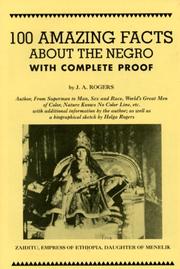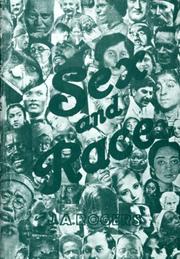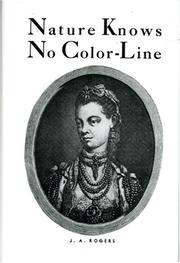| Listing 1 - 9 of 9 |
Sort by
|
Book
ISBN: 081957550X 9780819575500 9780960229468 Year: 1989 Publisher: [Middleton, Connecticut]
Abstract | Keywords | Export | Availability | Bookmark
 Loading...
Loading...Choose an application
- Reference Manager
- EndNote
- RefWorks (Direct export to RefWorks)
Classic work of black study indicating a place for African people within Western history
African Americans --- History --- United States --- Participation, African American.

ISBN: 0819575496 9780819575494 9780960229475 Year: 2014 Publisher: [Place of publication not identified]
Abstract | Keywords | Export | Availability | Bookmark
 Loading...
Loading...Choose an application
- Reference Manager
- EndNote
- RefWorks (Direct export to RefWorks)
Classic collection of black history and trivia
African Americans --- Blacks --- Negroes --- Ethnology --- History --- Black persons --- Black people

ISBN: 0819575569 9780960229413 9780819575562 Year: 2012 Publisher: St. Petersburg, Florida : Helga M. Rogers,
Abstract | Keywords | Export | Availability | Bookmark
 Loading...
Loading...Choose an application
- Reference Manager
- EndNote
- RefWorks (Direct export to RefWorks)
Classic work of black study provides detailed historico-biographical surveys of black history
Miscegenation. --- African Americans. --- Blacks. --- Race relations. --- Integration, Racial --- Race problems --- Race question --- Relations, Race --- Ethnology --- Social problems --- Sociology --- Ethnic relations --- Minorities --- Racism --- Negroes --- African Americans --- Afro-Americans --- Black Americans --- Colored people (United States) --- Africans --- Blacks --- Hybridity of races --- Racial amalgamation --- Racial crossing --- Race relations --- Racially mixed people --- Black persons --- Black people --- Black people. --- Miscegenation (Racist theory).

ISBN: 0819575526 9780819575524 9780960229482 0960229485 Year: 1993 Publisher: [Middleton, Connecticut]
Abstract | Keywords | Export | Availability | Bookmark
 Loading...
Loading...Choose an application
- Reference Manager
- EndNote
- RefWorks (Direct export to RefWorks)
JOEL AUGUSTUS ROGERS (September 6, 1880-March 26, 1966) was a Jamaican-American author, journalist, and historian who contributed to the history of Africa and the African diaspora, especially the history of African Americans in the United States. His research spanned the academic fields of history, sociology and anthropology. He challenged prevailing ideas about race, demonstrated the connections between civilizations, and traced African achievements. He was one of the greatest popularizers of African history in the twentieth century. Rogers addresses issues such as the lack of scientific supp.

ISBN: 0819575518 9780819575517 9780960229451 Year: 1980 Publisher: St. Petersburg, Florida : Helga M. Rogers,
Abstract | Keywords | Export | Availability | Bookmark
 Loading...
Loading...Choose an application
- Reference Manager
- EndNote
- RefWorks (Direct export to RefWorks)
In Nature Knows No Color-Line, originally published in 1952, historian Joel Augustus Rogers examines the origins of racial hierarchy and the color problem. Rogers was a humanist who believed that there were no scientifically evident racial divisions--all humans belong to one "race." He believed that color prejudice generally evolved from issues of domination and power between two physiologically different groups. According to Rogers, color prejudice was then used a rationale for domination, subjugation and warfare. Societies developed myths and prejudices in order to pursue their own interests at the expense of other groups. This book argues that many instances of the contributions of black people had been left out of the history books, and gives many examples.
Racially mixed people. --- Miscegenation. --- Black race. --- Negro race --- Race --- Hybridity of races --- Racial amalgamation --- Racial crossing --- Race relations --- Racially mixed people --- Bi-racial people --- Biracial people --- Interracial people --- Mixed race people --- Mixed-racial people --- Mulattoes --- Multiracial people --- Peoples of mixed descent --- Ethnic groups --- Miscegenation --- United States --- Race relations. --- Race question --- Multiracial people. --- Miscegenation (Racist theory).
Book
Year: 1978 Publisher: Edinburgh : Botanical society of Edinburgh,
Abstract | Keywords | Export | Availability | Bookmark
 Loading...
Loading...Choose an application
- Reference Manager
- EndNote
- RefWorks (Direct export to RefWorks)
Book
Year: 1995 Publisher: Groningen Historisch onderzoeksburo histodata
Abstract | Keywords | Export | Availability | Bookmark
 Loading...
Loading...Choose an application
- Reference Manager
- EndNote
- RefWorks (Direct export to RefWorks)
Book
Year: 1962 Publisher: Oxford: Blackwell,
Abstract | Keywords | Export | Availability | Bookmark
 Loading...
Loading...Choose an application
- Reference Manager
- EndNote
- RefWorks (Direct export to RefWorks)
Book

ISBN: 9781400827879 Year: 2021 Publisher: Princeton, NJ
Abstract | Keywords | Export | Availability | Bookmark
 Loading...
Loading...Choose an application
- Reference Manager
- EndNote
- RefWorks (Direct export to RefWorks)
| Listing 1 - 9 of 9 |
Sort by
|

 Search
Search Feedback
Feedback About UniCat
About UniCat  Help
Help News
News